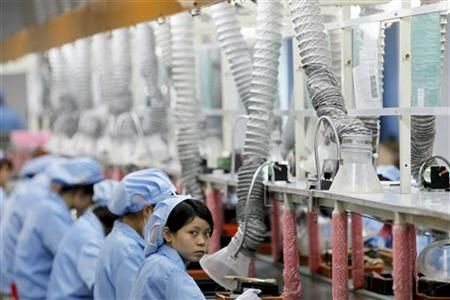China Rural Migrants Young, Restless and Online: Report

China's young migrant workers believe manufacturers can afford bigger pay rises and they are increasingly willing to strike to win them, according to a report that documents the spread of labor unrest across the country's export zones.
The Hong Kong-based China Labour Bulletin, which advocates stronger rights for workers, also said in the report on Tuesday the tens of millions of young migrants from the Chinese countryside are increasingly adept at using the Internet to mobilize.
Workers now understand that many enterprises are profitable enough to accommodate wage increases, and the workers are now more determined and able to push for those increases, the non-governmental organization said.
Whereas in the past, workers tended to wait for their rights to be violated before taking action, they are now becoming more proactive.
The study is the latest to examine China's new generation of increasingly assertive workers from the countryside, who have no desire to return to farms and want to win a foothold in urban society, despite discrimination and high costs.
They're not going to go back to the village and add an extra story to the family farmhouse. They want to build a life for themselves in the city, and to do that they need money, Geoffrey Crothall, a spokesman for China Labour Bulletin, told Reuters TV.
And that is why you're seeing a lot more strikes and protests in China now because the demands of workers are getting higher and they're more willing to stand up for themselves.
In February, President Hu Jintao singled out migrant workers as one of the challenges to the stability the ruling Communist Party prizes as a key to one-party control and economic growth.
China has about 153 million migrant workers living outside their hometowns, and by 2009, 58.4 percent of them belonged to the new generation migrants born in 1980 or after, according to a National Bureau of Statistics survey.
More than 100 million rural Chinese people will settle in towns and cities in the next decade, many of them young migrants who lack old-age and medical insurance in the places they want to call home, China's National Population and Family Planning Commission said in a report.
I don't have a definite direction. I work in this factory today and the other tomorrow, Wang Long, a 24-year-old migrant worker in Beijing told Reuters TV. What can I do if I get old? It will be very bad if I cannot have a formal and stable job when I'm in my thirties. How could I raise my family then?
Although migrant workers have often won pay rises in recent years, they feel poorly served by China's official, Communist Party-run trade union, which has often sided with management in factory disputes, the China Labour Bulletin said in the report.
Instead, strikes and labor protests have spread through informal channels, with workers often using mobile phones and Internet message sites to coordinate, it added.
They are giving each other in real time updates of their protests, and this has allowed workers' rights groups, lawyers interested in workers' rights, to offer advice, help them push their demands, said Crothall, the Labour Bulletin spokesman, speaking of these digital tools.
The China Labour Bulletin report estimates that in 2009 China experienced about 30,000 collective labor protests, and adds there is certainly no reason to suspect that the number of strikes is decreasing.
Government-run arbitration and mediation bodies took on more than a million work disputes in 2010, according to the report.
In June, migrant workers in far southern China's vast manufacturing belt rioted, trashing government offices, police vehicles and cars before security forces overwhelmed them.
A string of strikes at Japanese-owned vehicle parts makers last year also showed the growing boldness of younger workers.
A recent survey found that 73 percent of migrant workers were willing to join a lawful organization to represent migrants, according to a report from the State Council Development Research Center, a high-level think tank in Beijing.
(Additional reporting by Jimmy Guan in Beijing and Stefanie McIntyre in Hong Kong; Editing by Yoko Nishikawa)
© Copyright Thomson Reuters 2024. All rights reserved.





















